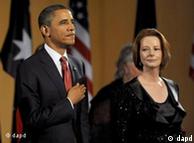中午新聞弱 宋林登記 消遣馬之home stay 要他stay home 蔡之Taiwan Next 在找工作時被拒 台灣來的? Next 所以要Taiwan First
美國之了不起 可參考紐約時報的這篇感謝在野共和黨的辯論 給美國人許多難忘的時刻
Counting Really Small Blessings
By GAIL COLLINS
This year, don't forget to give thanks for the Republican presidential debates. Seriously, they have given us so many truly interesting TV moments.
歐洲債務危機和美國經濟疲軟的衝擊波抵達中國。新的經濟數據顯示,中國的經濟發展已受到抑制。匯豐銀行公佈的11月中國採購經理指數降至32個月來最低。
美中兩國爭雄 東盟諸國漁利
美國重返亞洲舞台,與中國爭雄,亞洲國家作何反應?德媒認為亞洲人是靈活的商人,不會一邊倒地厚此薄彼,所以一方面歡迎美國夥伴,另一方面也不願與中國"老大哥"交惡,而是試圖在這兩大對手之間漁利。
美國開始重返亞洲
《法蘭克福匯報》11月22日評論說,"隨著最近幾天的馬拉松峰會,美國開始重返亞洲。中國作為該地區佔據優勢的大國,明顯地處於壓力之下。因為,就像先前的印度一樣,東南亞看出更接近美國會給自己帶來什麼樣的機會。正所謂鷸蚌相爭,漁翁得利。
"近幾年來,中國人有力地擴大了與南亞的外交關係和經濟關係。從巴基斯坦到太平洋島國,中國通過提供發展援助和軍事援助,以維持貨幣穩定為目的的數十億巨額投資計劃和協議,讓自己獲得一個深受歡迎的老大哥角色。而美國在布什時代的注意力則集中於阿拉伯世界。"
該報認為,"恰恰是東南亞越來越陷入中國的影響範圍。這不令人奇怪,因為在新加坡、馬來西亞、泰國和該地區最大的經濟體印度尼西亞,決定經濟生活的都是華裔。此外,北京對那些靠攏它的國家予以獎勵:中國在巴基斯坦、緬甸和斯里蘭卡建造基礎設施和海軍港口,給印度的周邊鄰國提供軍事援助和發展援助,最近在馬爾代夫建造使館就是明確的例證。
"美國現在在破壞中國的計劃,幫助印度和平利用核能,向面向亞洲的澳大利亞北部派遣美國駐軍,給印尼提供退役的美國戰鬥機,讓東南亞國家聯盟(東盟)的主要成員國以及日本加入與美國組成的跨太平洋自由貿易夥伴關係。美國人同時毫不含糊地讓中國人明白,美國不再容忍中國在南中國海領土衝突中尋求霸權地位,而是為一些提出領土訴求的東南亞國家撐腰。"
依然需要中國"老大哥"
該報指出,東南亞、澳大利亞和印度是美國政策轉折的贏家。 "……無論如何,東南亞國家懂得利用這個機會,計劃到2015年要聯合為一個經濟共同體,迅速促進貿易和投資。
"儘管美國的行動主義現在顯示了種種可能,但以為亞太地區會面臨權力的轉換,無疑是幼稚的。亞洲人是經驗豐富的商人,他們歡迎美國作為夥伴重返亞洲,卻不願以犧牲中國為代價優待美國。美國若能成功持久地將奧巴馬的宣告充實以內容,那麼除了中國之外,亞洲未來就會有兩個夥伴。東南亞不願"從一而終",而是善於根據具體情況利用雙方的優勢。"
《新蘇黎世報》11月21日的分析也持有類似看法。該報寫道:"儘管美國的外交"側翼掩護"在一些東南亞國家受到明確的歡迎,幾天前公佈的美國軍隊派駐澳大利亞的計劃還是受到批評性地評論,包括被印尼這個起著主導作用的東盟成員國批評。……東盟國家雖然拒絕中國的主導地位,但是人們根本就不願意與這個重要經濟夥伴弄壞關係,因為它會在危急關頭康康解囊、提供貸款。"
摘譯:林泉
責編:葉宣
(以上內容摘自或摘譯自其它媒體,不代表德國之聲觀點)
----
Ma's Lead Narrows as Rivals Enter Taiwan Election
By PAUL MOZUR And JENNY W. HSU
TAIPEI—Taiwan President Ma Ying-jeou is slipping in the polls as candidates for a January election formally register this week, setting the stage for a tight contest closely watched in Beijing and Washington.
Mr. Ma, the onetime favorite, has fallen behind opposition Democratic Progressive Party candidate Tsai Ing-wen less than two months before the Jan. 14 vote, amid rising economic worries among voters, according to one measure. Ms. Tsai would receive 48.6% of the vote while Mr. Ma would get 44.1%, according to Monday results from National Chengchi University's Center for Prediction Markets, which lets people bet on the outcome with fake money and has proven accurate in the past. Other polls have the two running mostly even.
James Soong, a third-party candidate expected to register Thursday, would get 8.2% of the vote, according to the university's political-futures market. He is considered a threat to Mr. Ma because both support closer ties to China.
Analysts say Mr. Soong's support largely stems from dissatisfaction with Mr. Ma. "Ma must strengthen his grass-roots campaign by sleeping less and shaking more hands," said Alexander Huang, Tamkang University professor of political science. Citing Mr. Ma's push for stronger economic ties with China, Mr. Huang added that "he needs to find a different way to convince the voters that a peaceful cross-strait relationship is by far more essential to maintaining Taiwan's long-term stability."
Voters such as Karen Tsai are not convinced. "Taiwan needs a president who will not solely count on China for its economic growth," said the financial-industry worker, who said she plans to vote for Ms. Tsai. "Ma's China-focused policy will only put Taiwan in a more vulnerable position both economically and politically."
The election is being monitored on both sides of the Pacific Ocean because a shift away from the Beijing-friendly policies of Mr. Ma and his ruling party, the Kuomintang, could increase cross-strait tensions. Ms. Tsai has said she supports improved relations with China, but her party backs independence from Beijing and China has historically responded negatively to DPP rule of Taiwan.
People familiar with U.S. policy toward China say that Taiwan has been less of an issue between Washington and Beijing under Mr. Ma, despite terse words between the two countries in September over U.S. plans to upgrade the island's F-16 fighter jets. Analysts said U.S. officials might look for small ways to help Mr. Ma, such as quickening continuing efforts to drop Taiwan visa requirements for visits to the U.S., while trying to keep from appearing to meddle in the island's domestic affairs.
The election is widely viewed as a referendum on Mr. Ma's efforts to thaw relations with China, but it also has been marked by an increased emphasis on the island's slow wage growth, rising unemployment and a widening wealth gap.
Taiwan's wealth gap narrowed slightly in 2010 from record levels in 2009, with the richest 20% earning 6.19 times more on average than the poorest 20%, according to government statistics. Meanwhile, unemployment is stuck above 4%, an enviable level at a time of slow growth in the U.S. and Europe, but a disappointing one in the context of Mr. Ma's promise to keep it under 3% and Taiwan's 10.88% growth rate last year. Wage growth also has been flat under Mr. Ma.
Meanwhile, growth is expected to slow, with the government forecasting GDP rising 4.56% in 2011 and 4.38% in 2012. Taiwan's stock market has fallen 24% and on Tuesday hit its lowest intraday level since September 2009 amid rising economic skepticism and the departure of foreign funds.
Mr. Ma also is seen as making missteps on the issue of China, especially last month, when he proposed talks over a peace pact with Beijing within the decade that would go beyond the current economic rapprochement. Last week at a Foreign Correspondent's Club news conference, Mr. Ma's chief campaign strategist, King Pu-tsung admitted the campaign had failed to anticipate how sensitive the pact would be.
Meanwhile, Ms. Tsai seems to be increasingly gaining the support of independent voters with a campaign focused on social issues and growing Taiwan's domestic economy with policy points such as reducing restrictions against foreign professionals, growing the social safety net, and subsidies for farmers. Ms. Tsai also has made some inroads with the business community, traditionally a Kuomintang stronghold, with comments about China seen as more moderate than the platform of her pro-independence party.
—Jeremy Page in Beijing contributed to this article.
沒有留言:
張貼留言